Premium Only Content
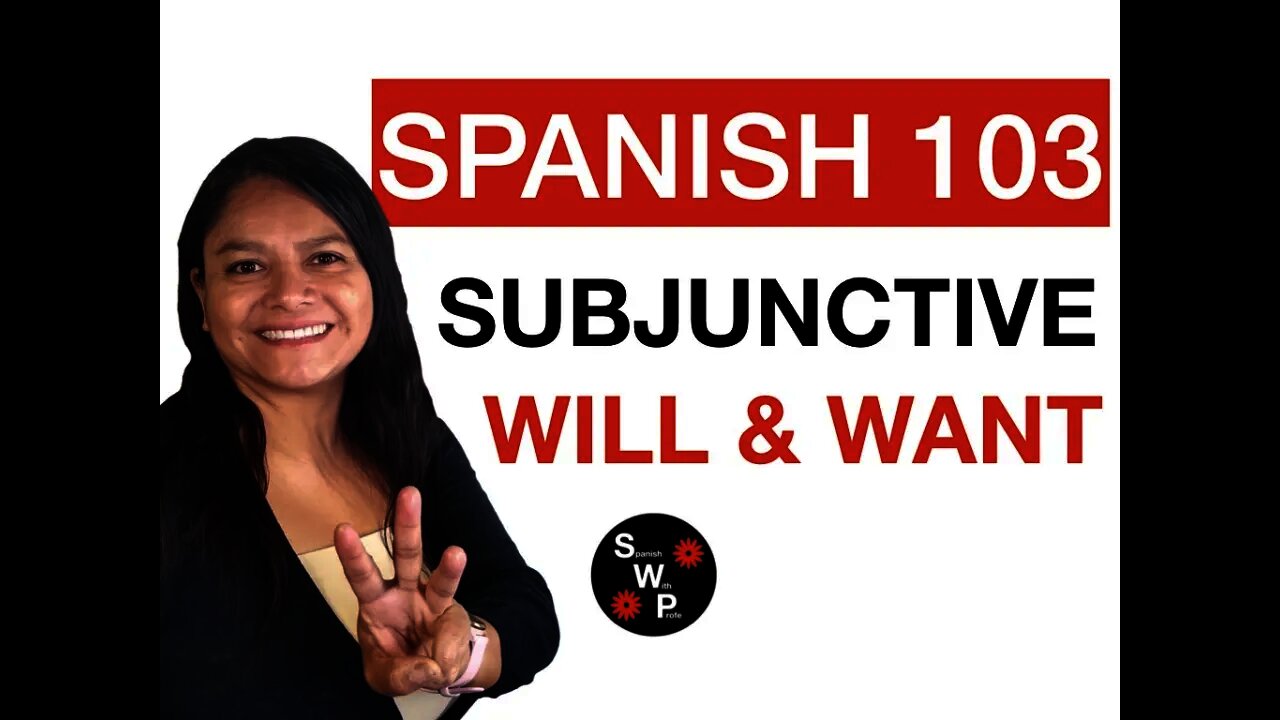
Spanish 103 - Spanish Present Subjunctive with Verbs of Will, Want WEIRDO Part 1 Spanish With Profe
In this video you will learn the subjunctive with verbs of will/want/and influence.
The subjunctive is a mood that cannot stand by itself, it depends on verbs of the WEIRDO, WEDDING category.
WEDDING=W-stands for Wish/Want/Will, E for emotion, D for desire, doubt, denial, I for impersonal expressions, and G for God
WEIRDO=W for Wish/Want/Will; E for emotions, I for impersonal expressions, D for denial/desire/doubt, and O for ojalá.
The subjunctive happens in the subordinate clause.
There are regular verbs, irregular verbs, stem-changing verbs. There are also spelling changes.
The subjunctive mood is formed by changing the -ar endings to their opposite vowel.
-ar
yo -e
tú -es
él, ella, usted -e
nosotros/as -emos
ellos, ellas, ustedes -en
The subjunctive mood is formed by changing the -er/-ir endings to their opposite vowel.
-er/-ir
yo -a
tú -as
él, ella, usted -a
nosotros/as -amos
ellos, ellas, ustedes -an
Most irregular verbs will be formed by using the present Yo form and dropping the "o" and exchanging it for the new vowels.
hacer=hago = haga
salir=salgo = salga
poner=pongo = ponga
You will form the other ones by following the same pattern so:
que yo haga, que tú hagas, que él, ella, usted haga; que nosotros/as hagamos, que ellos, ellas, ustedes hagan
There are other irregular verbs that have to be formed differently for example.
ir= vaya (follow the pattern)
ser=sea (follow the pattern)
saber=sepa (follow the pattern)
the above subjunctive forms are for yo but it will guide you to form the other subject pronouns in the subjunctive
dar=dé, des, dé, demos, den
With dar is very important to put an accent mark or tilde in the yo and the él, ella, usted forms so it can note that it is the subjunctive form of the verb dar and not the preposition= from= "de"
In the subjunctive the following endings have a spelling change for sound purpose, and the change is applied to all of the subject pronouns: yo, tú, él, ella, usted, nosotros/as, ellos, ellas, ustedes
-car=qu
-gar=gu
-zar=c
-ger=j
A (subject/person) + verb (weirdo/wedding) + que + B (subject/person) + verb (subjunctive)
Remember that the subjunctive requires a distinct subject A and a verb of the category of weirdo/wedding and a different subject B in order to have the subjunctive form on the verb right after the B person.
Yo quiero que ellos vengan (venir) a la fiesta. (I want them to come to the party.)
yo= subject A
quiero=verb that triggers subjunctive
que (connects the first part of the sentence and the second part, the subordinate clause)
ellos= subject B
verb=vengan because it s the subjunctive
Ellos insisten en que nosotros paguemos (pagar) la cuenta. (They insist that we pay the bill.)
ellos=Subject A
insisten=verb triggering the subjunctive
que= relative pronoun that connects sentence/subject A with sentence/subject B
nosotros= Subject B
paguemos=verb in the subjunctive (since pagar ends in -gar, we must make a spelling change -gu and then apply the new vowels to denote the subjunctive)
If there is no change in subject you will have to leave the second verb in its original form=the infinitive=unconjugated verb form
Es necesario llegar (llegar) temprano. (It's necessary to arrive early)
There is no change in subject therefore you will leave llegar in its infinitive form.
Queremos dormir (dormir). (We want to sleep.)
There is no change in subject so do not do anything to dormir.
If there is a change in subject you will see the following
Es necesario que tú llegues (llegar) temprano.
(It is necessary for you to arrive early.)
Es necesario= Subject A
que= connects the two parts A and B
tú= Subject B
llegues= verb subjunctive form
This is now using the subjunctive as we are following the Subjunctive Formula.
The subjunctive requires two different subjects (A subject) + verb (weirdo/wedding) + que + (B subject) + verb (subjunctive)
If there is no change in subjects then you must leave the second verb in its original form.
(YO) Quiero correr (correr). (I want to run).
In here there is no subjunctive. There's only one subject Yo, therefore there is no change in subject and you leave the second verb in its original form (correr)
vs.
Quiero que ella corra (correr). (I want her to run).
In here there is subjunctive because it meets the subjunctive formula:
Subject A, verb, que, Subject B, verb (subjunctive)
Some Ways Below To Help Out The Channel Listed Below
► DONATIONS via PayPal (To help support the channel you can donate via PayPal): https://paypal.me/SpanishWithProfe?locale.x=en_US
► ROBINHOOD (Get 1 Stock When You Sign Up. Easy to use app for investing and you get a free stock.): https://join.robinhood.com/grants1730
► WEBULL (Get 2 Stock When You Sign Up):https://www.webull.com/activity/get-free-stocks?inviteCode=uYiu2aNdG46N&source=invite_gw&inviteSource=wb_oversea
► CRYPTO.COM Use my referral link https://crypto.com/app/e3p3g4rc9m to sign up for Crypto.com and we both get $25 USD :)
-
 0:33
0:33
Spanish With Profe
1 year agoLearn how to say freeway/ highway in Spanish #carretera #autopista
347 -
 13:08
13:08
Spanish With Profe
3 years agoSpanish 103 - Present Subjunctive vs Indicative with Adjective Clauses in Spanish Spanish With Profe
1329 -
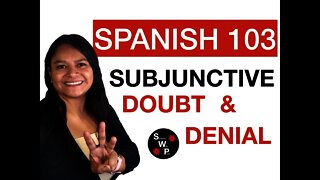 17:59
17:59
Spanish With Profe
4 years agoSpanish 103 - Learn Spanish Present Subjunctive with Doubt, Denial and Disbelief Spanish With Profe
1239 -
 13:24
13:24
Spanish With Profe
4 years agoSpanish 103 - Learn the Spanish Present Subjunctive with Emotions and Feelings Spanish With Profe
3218 -
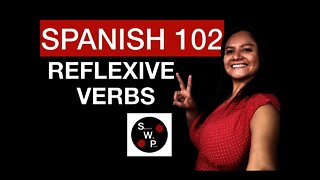 17:02
17:02
Spanish With Profe
4 years agoSpanish 102 - Using Reflexive Verbs In Spanish, Reflexive Verbs Present Tense - Spanish With Profe
78 -
 6:27
6:27
Spanish With Profe
4 years ago $0.03 earnedSpanish 101 - Learn Spanish ER and IR Verbs - Spanish With Profe
297 -
 10:43
10:43
Spanish With Profe
4 years ago $0.02 earnedSpanish 101 - Learn Spanish Irregular Verbs for Beginners - Spanish With Profe
326 -
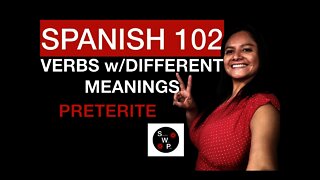 11:13
11:13
Spanish With Profe
4 years agoSpanish 102 - Spanish Verbs with Different Meanings for Beginners Spanish With Profe
122 -
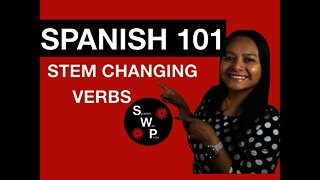 10:35
10:35
Spanish With Profe
4 years ago $0.03 earnedSpanish 101 - Learn Spanish Stem Changing Verbs for Beginners - Spanish With Profe
8531 -
 8:01
8:01
Spanish With Profe
3 years ago $0.03 earnedSpanish 103 - Well-Being Spanish Vocabulary for Beginners Spanish With Profe
18211